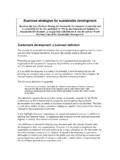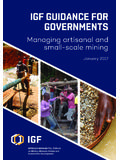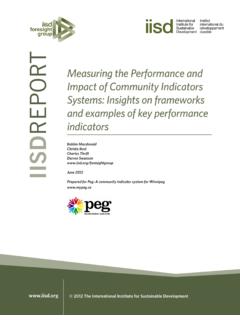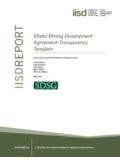Transcription of Arbitrator Independence and Impartiality: Examining …
1 Nathalie Bernasconi-Osterwalder Lise Johnson Fiona Marshall IV Annual Forum for Developing Country Investment Negotiators Background Papers New Delhi, 27-29 October 2010 Arbitrator Independence and Impartiality: Examining the dual role of Arbitrator and counsel Arbitrator Independence and Impartiality: Examining the dual role of Arbitrator and counsel i 2011 International Institute for Sustainable Development (IISD) Published by the International Institute for Sustainable Development IISD contributes to sustainable development by advancing policy recommendations on international trade and investment, economic policy, climate change and energy, measurement and assessment, and natural resources management, and the enabling role of communication technologies in these areas. We report on international negotiations and disseminate knowledge gained through collaborative projects, resulting in more rigorous research, capacity building in developing countries, better networks spanning the North and the South, and better global connections among researchers, practitioners, citizens and policy-makers.
2 IISD s vision is better living for all sustainably; its mission is to champion innovation, enabling societies to live sustainably. IISD is registered as a charitable organization in Canada and has 501(c)(3) status in the United States. IISD receives core operating support from the Government of Canada, provided through the Canadian International Development Agency (CIDA), the International Development Research Centre (IDRC) and Environment Canada, and from the Province of Manitoba. The Institute receives project funding from numerous governments inside and outside Canada, United Nations agencies, foundations and the private sector. International Institute for Sustainable Development 161 Portage Avenue East, 6th Floor Winnipeg, Manitoba Canada R3B 0Y4 Tel: +1 (204) 958 7700 Fax: +1 (204) 958 7710 Email: Website: IV Annual Forum for Developing Country Investment Negotiators Background Papers New Delhi, 27-29 October 2010 Arbitrator Independence and Impartiality: Examining the dual role of Arbitrator and counsel Nathalie Bernasconi-Osterwalder Lise Johnson Fiona Marshall Martin Streicher-Porte, Empa Hans J rg Althaus, Empa February 2010 A Life Cycle Assessment Study Belgium s Model Bilateral Investment Treaty: A review Nathalie Bernasconi-Osterwalder Lise Johnson March 2010 Draft for Discussion Arbitrator Independence and Impartiality: Examining the dual role of Arbitrator and counsel ii Table of Contents Introduction.
3 1 Arbitration Rules on Arbitrator Independence and Impartiality .. 7 The UNCITRAL Arbitration Rules .. 8 The ICSID Convention and its Arbitration Rules .. 9 The SCC Arbitration Rules .. 13 The ICC Arbitration Rules .. 15 Decisions Regarding the Dual Arbitrator /Counsel .. 17 Service as an Arbitrator and Counsel For or Against One of the Parties in Investor-State or other Matters .. 17 Concurrent Service as Arbitrator and Counsel in Investor-State Matters .. 24 Summary .. 27 Guidelines on Arbitrator Independence and Impartiality .. 28 IBA Guidelines on Conflicts of Interest in International Arbitration .. 29 The Burgh House Principles on the Independence of the International Judiciary .. 34 How Other Procedures have Addressed the Dual-Role Issue .. 36 International Court of Justice .. 36 Court of Arbitration for Sport (CAS) .. 38 FINRA Securities Arbitration.
4 39 Ways Forward .. 42 Reform of the Arbitration Rules through Formal Amendment or Interpretation .. 43 ICSID Convention and Arbitration Rules .. 43 UNCITRAL Arbitration Rules .. 45 ICC Rules .. 45 Institutional Interpretations of the Arbitration Rules .. 46 Revision of IBA s Guidelines on Conflicts of Interest in International Arbitration .. 47 Arbitrator Independence and Impartiality: Examining the dual role of Arbitrator and counsel iii Inclusion of Express Provisions in IIAs or Issuance of Interpretative Statements .. 47 Express provisions in the 47 Interpretative Statements regarding the IIA .. 49 Joint Interpretative Statements .. 49 Unilateral Interpretative Statements .. 49 Conclusion .. 51 Arbitrator Independence and Impartiality: Examining the dual role of Arbitrator and counsel 1 Introduction A common1 aspect of most international investment agreements (IIAs) is that they permit foreign investors to bring legal claims directly against host States before international arbitral tribunals.
5 Reasons often given for this unique development in IIAs are that, by providing for investor-State dispute resolution through international arbitration, IIAs depoliticize investor-State disputes and help guarantee their just and efficient resolution. Yet to achieve these goals, the dispute settlement process must be legitimate in both appearance and reality. Absent such legitimacy, investors and States may lose confidence in the system, and the intended efficiency and certainty of the process will decline due to an increase in challenges to arbitrators and awards. The importance of ensuring legitimacy in the dispute resolution process is, however, by no means an issue unique to the context of investor-State arbitration. Indeed, governments worldwide have significant experience with developing and implementing various institutional safeguards that aim precisely to ensure legitimacy of their judicial systems.
6 And although these safeguards are not identical between or even within countries, they often share common features, key among which are rules and mechanisms aiming to ensure adjudication by independent and impartial officials. These rules and mechanisms include those guaranteeing adjudicators security of tenure, establishing objective mechanisms for assigning judges to particular cases, restricting judges outside remuneration, ensuring the transparency of proceedings, and providing for review of Together, these rules and mechanisms help ensure that disputes are decided on their merits, and protect the legitimacy of the proceedings and their outcomes. Yet notably, investor-State arbitrations lack these common institutional safeguards protecting the legitimacy of proceedings. First, arbitrators are appointed on a case-by-case basis.
7 This leaves open the possibility that how an Arbitrator decides one dispute can have an impact on his or her future employment, a consequence that may influence the Arbitrator s decision in the case. Second, arbitrators are selected either by the parties or by appointing authorities, with each approach raising issues regarding the Arbitrator s Independence from the party or entity that made the appointment (and therefore supplied the employment). Third, arbitrators (independently or through their law firms) can concurrently earn money through other professional activities, including serving as counsel for investors or States in separate (though similar) investor-State arbitrations, and serving on the board of directors of commercial entities with financial or other interests in the parties, issues or outcomes. Fourth, investor-State arbitration proceedings including challenges to arbitrators for 1 This paper is an updated version of the background paper for the IISD Consultation on Priorities and Process for Procedural Reform in Investor-State Arbitration, held in July 2010 in Barcelona.
8 2 Van Harten, G. (forthcoming 2010). Five justifications for investment treaties: A critical discussion. Trade Law & Development, 2(1); see also Burgh House Principles on the Independence of the International Judiciary, June 2004. Arbitrator Independence and Impartiality: Examining the dual role of Arbitrator and counsel 2 lack of Independence and impartiality, decisions on those challenges, and final awards generally lack transparency, allowing arbitrators to issue decisions and awards relatively free from outside scrutiny. And finally, because arbitration proceedings and the decisions they produce are often significantly shielded from judicial review, important checks on the propriety of the proceedings are few. The absence of these safeguards to ensure Arbitrator Independence and impartiality in investor-State arbitrations is a problem that States and arbitral institutions such as the World Bank s International Centre for the Settlement of Investment Disputes (ICSID) need to address.
9 Under the status quo, cases and anecdotes reveal that allegations of Arbitrator bias arising from diverse fact patterns and relationships pepper the disputes, prolonging proceedings and opening ultimate awards up to strong critique. And, as Jan Paulsson recently stated, the troubling reality is that the extreme cases remain unknown, because improper behaviour is shrouded in urbane subterfuge and hypocrisy. 3 Calls for significant institutional reform have accordingly been made. Paulsson, for example, has argued that all arbitrators should be chosen jointly or selected by a neutral body and has proposed that, unless and until that is the rule, an alternative solution could be an institutional requirement that appointments be made from a pre-existing list of qualified arbitrators [..] composed judiciously by a reputable and inclusive international body, with built-in mechanisms of monitoring and renewal.
10 4 Having done much work cataloguing flaws in current investor-State arbitration practices, Gus van Harten has made a broader proposal than Paulsson, advocating the development of a standing international investment While work on those longer-term, comprehensive approaches continues, there must also be parallel work on patches to prevent tainted decisions and to slow the flow of legitimacy bleeding from the current approach to investor-State dispute settlement due to lack of adequate guarantees of Arbitrator Independence and impartiality. One way to do this is to enforce (and, where necessary, revise and strengthen) the existing patchwork of laws, rules and guidelines relevant to the issue of Arbitrator Independence and impartiality in investor-State arbitration. This patchwork includes the various sets of procedural rules that may apply in a given investor-State arbitration.






